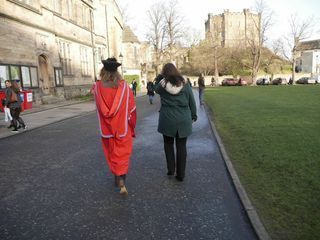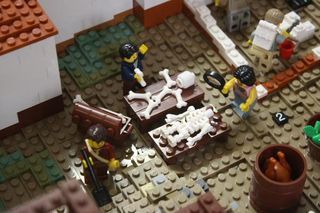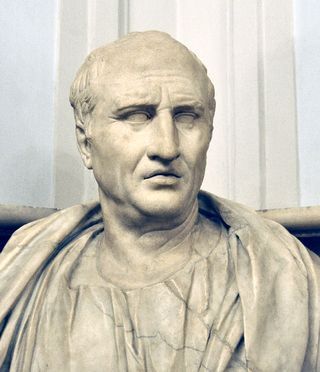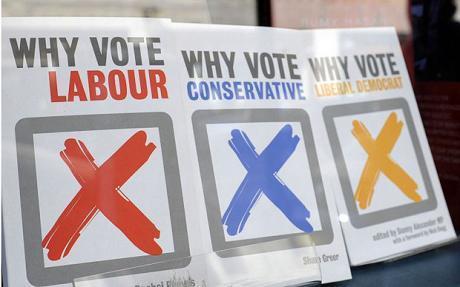Mary Beard's Blog, page 27
February 6, 2015
Alarm-clock Britain?
I had a little outing on Newsnight last night (the text is here). It was part of their little series on how to fix modern democracy. I don't think that I have any recipe for fixing it. In fact, I'm probably not quite as sure as many are that it is badly broken -- or at least I'm not sure whether a trip back 100 years, still less 2500 years, would offer us a version of democracy that we preferred (what about the women, for example?). The more optimistic line would be that reasonably healthy political systems ought to be dissatisfied with how they are doing.
Nonetheless, I am fairly certain that we need to think harder about political language and its increasing disengagement with MEANING anything. So we had a bit of light hearted attack on the empty slogans of current politics, "hard working families" being only the most famous. And this included a few glimpses of Nick Clegg's doomed attempt to launch "alarm clock Britain" as his own contribution to the slogan anthology (what DID it mean?... you can see Charlie Brooker's answer to that here).
But there was a bigger point that was also developed in the discussion with Phil Collins, once Tony Blair's speech writer, and -- I can assure -- you a good companion. (You should be able to access the full discussion here, about 30 minutes in.) I mean if politicians talk in soundbites, if they don't write their own speeches and if they don't even write their own tweets . . . how can they possibly complain that the electorate is disengaged? I mean there is nothing to engage with, apart from a brand.
My argument was NOT that the ancients got it right (people are always wanting me to say that, and it is almost never true). But I was trying to say that they did retain a real focus on words meaning something and being part of an ARGUMENT, rather than a set of disconnected slogans.
Overall I was pleased with how it had turned out and everyone at BBC did a great job. Fun with a point, I thought. The only person who came off badly was poor old Roy Jenkins. There was a clip of him talking about immigration, but after the editing he emerged as appearing to say the exact opposite of what he really was saying. The clip showed him saying "Immigration in reasonable numbers is a cross we have to bear...". What he actually said was "Let there be no suggestion that immigration in reasonable numbers is a cross we have to bear..". That is to say (to oversimplify his argument a bit) he was talking about the centrality and importance of immigration to modern life, rather than than seeing immigration as something that was to be "tolerated".
It was a bit of an odd editing mistake to make in a piece about soundbites and the meaningfulness of political language! (You can find the full text in various places, including Peter Kellner's book "Democracy", which is pre-viewable on Google books.)
So what is my fix? Well I dont really have one. But I do think it would be a good idea if we all read Orwell's essay "Politics and the English Language" who was talking about just this in the 1940s (a nice sign that this is not a new problem). And I think possibly we ought just to laugh -- a rampant chorus of giggles -- when ever one of these soundbites comes out.
February 1, 2015
Rubens and body image
We had an intriguing discussion on Friday night about Rubens and body image. It was at the Royal Academy in conjunction with the "Rubens and his Legacy" show.The point was to confront the basic, common idea of the "Rubenesque"...or, to go down a notch or two, the idea that Rubens is all about fat women. I mean, there are plenty of fat men in the Rubens repertoire, and plenty of people who are not fat at all, and plenty of clothed bodies and religious bodies... so how do we approach them?
Our panel on Friday consisted in me (as chair, probably talking too much), with in alphabetical order Germaine Greer, Grayson Perry, and Tom Shakespeare. Both Grayson and Tom expressed some antipathy to Rubens as a kick off, but where did we go from there?
Well the truth is that for quite a lot of the time we rater skirted the body issue. Take the painting above, of the Rape of the Daughters of Leucippus by Castor and Pollux, which was not in the RA show (although a sketch for it was). Interestingly, both panel and audience tended to focus on everything but the rape.
Germaine wanted to talk about this as abduction, not rape (I worry about that distinction). One audience comment pointed us to the horses. I still felt that the central part of the painting was -- like it or not -- rape.
Tom was concerned to focus on the Beauty and the Beast theme, which actually worked rather well. He focussed in on the Rubens painting just above, of Maria Grimaldi with (her?) dwarf. I thought this was an extraordinary image -- partly because of the conceit about a dwarf being as big as the woman (what do we imagine he was standing on?) Predictably Tom packed a punch on this (he is a dwarf.. and has a pretty inalienable right to speak on the subject). But he took it on to the wider theme in Rubens of swarthy blokes, often animaline in some form, in sexual conflict/congress with a very white woman.
This seems to me to pick up classical themes (satyr vs nymph) but to go way beyond. As does this body image of female satyrs in the corner of another Rubens canvas.
I wonder what people make of the those figures at bottom right. This seems to me to be putting two fingers up at classical iconography??
January 29, 2015
Political Book of the Year
For the last three years, one of my favourite "jobs" has been to be a judge for "the political book of the year", a set of literary prizes masterminded by Iain Dale, who has been a good mate since we bumped into each other, from the opposite ends of the political spectrum, on a radio panel discussion a few years ago.
Anyway, last night was the presentation of the awards. Amazingly we met in my judging category -- which was the overall "political book of the year" -- over a week ago and there wasn't a leak at all, and the same went for all the other categories (polemic, practical politics, international affairs etc) so far as I could see. When I sat down in the IMAX in London last night, I hadn't a clue who had won what.
I had a particular interest in two of the many categories of prizes. First, was the one I'd been a judge for. There was a fantastic array of contenders here, including Andrew Roberts's Napoleon, Chris Bryant's History of Parliament, and Alan Johnson's Please Mister Postman. But the winner was (as they say) a great book by Robert Ford and Matthew Goodwin, Revolt on the Right.
This is a book about the rise of UKIP, and it is both unashamedly academic and very nicely written (not as rare a combination as people often assume). And it was written before UKIP's recent successes, and actually predicted those successes pretty accurately. I thought a fascinating and essential read.
The other category I was concentrating on was the "World War One Book of the Year", as I was actually presenting the award for this one. I can tell you that presenting the award if almost as nerve wracking as waiting for the announcement wondering if you have won it -- not quite I admit.. but I do know quite a lot about turning up to an awards ceremony, knowing I am on the shortlist, and not getting it! (The inside story, I am told, is if the award organisers appear worried about your transport arrangements and offer to send a car, you've probably won.)
What's nerve wracking? Well the whole issue of whether you will bungle the whole thing, whether you will say the poor winner's name wrong, and frankly look a real damn fool, partly because you already took too much drink at the prequel party.
Anyway, I think I managed. And the winner was David Olusoga for his book The World’s War. I was really pleased about this, as I have been banging on a bit about how, in WW1 commemorations, we ought to be getting a bit further beyond the western front and British troops. And here was a book that did just that.
So congratulations all round.
January 22, 2015
Lego Pompeii
If you're looking for a reason to visit Australia in 2015, let me suggest a visit to the new Lego Pompeii in the Nicholson Museum, at the University of Sydney (apologies for that to all readers of this blog who already ARE in Australia).
This is exactly what it sounds: a model of Pompeii made out of 190,000 pieces of Lego, which took almost 500 hours to build. It's the third of the Nicholson Museum's Lego models (they've already done the Colosseum and the Acropolis), but this is the biggest yet and will be on show until the end of 2015.
These have all been the brainchild of Michael Turner of the Nicholson Museum, who was looking for a way of engaging kids with the ancient world without dumbing down... and he has teamed up with Lego maestro Ryan McNaught ("The Brickman") for the execution.
Whats really fun is the clever mixture between the ancient city, and the modern rediscovery and various bits of Pompeian popular culture. That's Andrew Wallace-Hadrill being interviewed in the middle of the forum above.
It must have been enormous fun to think up and make (there's a touch of the "Where's Wally?" about it..one of my favourite kids' books). The picture just above is a corner of the model where they have featured the wonderful Estelle Lazer, who has done such great work on the human bones of Pompeii... and here she is doing exactly that.
There on the right is Dr Who's tardis, just landed in someone's atrium -- and a nice reminder of the Dr 
 Who Pompeii episode. (Click on the image and the tardis will become a bit clearer!). And on the left is Alexandre Dumas, who was briefly the director of excavations on the site (not a hugely distinguished one it must be admitted). You'll also find Mozart getting inspired by the Temple of Isis, Pink Floyd who famously played there, the riot in the amphitheatre between the Pompeians and the Nucerians, Winckelmann wandering across the forum (looking for Andrew Wallace Hadrill. I suspect).
Who Pompeii episode. (Click on the image and the tardis will become a bit clearer!). And on the left is Alexandre Dumas, who was briefly the director of excavations on the site (not a hugely distinguished one it must be admitted). You'll also find Mozart getting inspired by the Temple of Isis, Pink Floyd who famously played there, the riot in the amphitheatre between the Pompeians and the Nucerians, Winckelmann wandering across the forum (looking for Andrew Wallace Hadrill. I suspect).
Oh and just round the corner, there's me on my bike. I'm jolly proud to be there. Thanks to you all at the Nicholson!
January 18, 2015
How to write
It comes as no surprise, or news, to readers of this blog that I am on the, I hope, home straight of my book on the history of ancient Rome. This post is not to give an update about chapter 7 (for which see here), but to wonder more generally about how (elegant) non fiction is actually written.
I have on various occasions complained that academic autobiographies give you very little insight into the process of actually writing.They spend an awful lot of time on the "networking" and what sex there was (I am thinking of K J Dover, here, and the famous wanking at the view from the top of a mountain that squeaked into his autobiography), but they spend precious little time on working out how the ideas in the head ever ended up as readable words on the page. That is what seems to me to be the most interesting part of the process.
What are the conditions for writing something that is actually interesting, and -- more to the point --not wrong?
Part of that is down to mates. I rely on one or two people who, I suspect, will be glancing at this blog, to tell me the truth. When they say it is dull, or that it reads too much like some lecture, or whatever, I pay attention. It takes a clever and supportive reader to say... "why don't you start that chapter where you end it?". And it's usually right.
But part of it is down to little rituals. For example, I have found, friendly to the environment or not, that I like to write in a room with a nice coal fire burning. Ok it takes a bit of time to tend, but it gives you live company that doesn't actually try to talk to you (perfect combo). And then there is the old-fashioned notebook beside you. I like to scrawl down in handwriting every big point I want to get into the chapter before I open the laptop. I like to list, scrawl out, reorder etc, all in long hand
Alcohol is a bit trickier. I have to say that by 6 o clock, I often (like this evening) get the feeling that a good glass of wine would help the next sentence hugely. The truth is that one glass does, but the second (which the first prompts) certainly does not.
Overall, I guess it is time that really does it. To be honest it's really is impossible to write more that 1500 good words a day. When people say to me.. oh I wrote 3000 words today, I feel both crushed (what, 3000 words?) and smug (I bet they werent any good). They may be scriptural geniuses, or more likely self-deluded.
But as you see I am pressing on, and if I could average 1000 words a day, I'd be home and dry.
January 14, 2015
Chapter seven
Time, I think, for a little update on book progress. In truth I should have finished it by now, but I am -- I confess -- a couple of months behind. (I like to say "only" a couple of months behind.) The good news is that I am now getting to the period that I regularly teach and have much more at my finger tips than the Hannibalic War, which means less prep before I feel can start writing.
That said, I'm finding that I am getting to grips with things that I have tended to avoid for most of my life. The main theme of this chapter is how Rome operated abroad in the century or so before the assassination of Caesar. It is a period when Roman rule in the provinces has a very bad name, and the excesses of Gaius Verres in Sicily, Cicero's adversary in 70 BCE, tend to be taken to symbolise that. Verres may have been pretty much guilty as charged -- as is suggested by the fact that he scarpered into voluntary exile after the first round of the court proceedings. But Cicero (that may be him in the picture above) was certainly hyping his crimes for all it was worth in the published text of his speeches that we can still read (which Cicero circulated after Verres had fled, including ones he would have delivered if Verres had not done the bunk).
Anyway, what has struck me over the last couple of weeks is not only how corrupt and extortionate some Roman rule overseas must have been, but also what great lengths they were going to in order to control and punish that kind of behaviour.
The one piece of legislation that has really impressed me is the law attempting to provide redress for the provincials against extortion by Roman officials. Introduced by Gaius Gracchus in 122 BCE, it is essentially the law under which Verres was tried. There is a Latin text of it here, with an English translation here (the two don't always exactly match, let me warn you, as the English is translating an older edition of the Latin). It's not absolutely complete, as the text comes from fragments of a Roman bronze tablet, found in the sixteenth century, the so called Tabula Bembina (there is a slightly later agrarian law inscribed on the other side of the bronze).
What strikes me about this law is quite how detailed and careful it is in thinking through the issues, the potential problems and how to get round them. It broaches the question, for example, of what to do if (as in the case of Verres) a guilty man isnt around to pay the compensation. It thinks carefully about conflict of interest on the part of the jurors who are to decide the case. And it is absolutely precise about how the votes are to be cast, and how the secrecy of the ballot is to be ensured.
OK, there are lots of things it doesn't do -- like it only gives compensation for financial loss. And it doesnt really address the problem of how a group of provincials from the wilds of Spain are really going to manage the Roman courts (though there is provision for giving them a patronus a kind of early version of legal aid. But overall it's pretty amazing as one of the first attempts to provide a framework of rules for provincial government. And I am planning to give it some star billing in Chapter seven. Good idea?
January 10, 2015
Celebrating in Durham
I don't often do the proud parent bit. But on Thursday we went up to Durham to watch the daughter getting her PhD (within 4 years!) for her thesis on, and I quote, "The making and remaking of Gogrial: Landscape, History and Memory in South Sudan". I'm a real toughie, but I was dead moved.
And it couldn't help remind me of the struggles to get my own PhD, which took rather longer than hers, it must be admitted. I still remember how cross I was when I got the "your four years is up" letter from Cambridge and my wise supervisor said he would only recommend a 6 month extension. (Good on him, in retrospect, else I'd still be doing it now.)
Anyway all this came flooding back, as we sat in Durham Cathedral (what a brilliant place for graduation) and then talked to the daughter's excellent supervisor (on right, below!.. that's Cherry and Zoe), and departmental  colleagues, those she had worked with in the Oriental Museum, and in the whole visual culture outfit, including Ludi Jordanova. Blimey, I say, what a place. If you want a mother's view, I'm giving it total full marks...(by the way they have some visual culture doctoral studentships coming up if you are interested in PhD work).
colleagues, those she had worked with in the Oriental Museum, and in the whole visual culture outfit, including Ludi Jordanova. Blimey, I say, what a place. If you want a mother's view, I'm giving it total full marks...(by the way they have some visual culture doctoral studentships coming up if you are interested in PhD work).
But then there are all the other things about graduation ceremonies that amuse.
I have done quite a few of these ceremonies in the last few years. Hugely enjoyable they are, even though occasionally the mind wanders as the 150th student goes up to shake the vice chancellorial hand. My secret is to look at the ladies' shoes, and to run a little competition in my head about who is the least sensibly shod. (To be honest some risk going arse over tip on their 6 inch stilletos when a girl like me would urge some flatties.)
But for now I am just being proud. And if anyone wants to know about South Sudan (and the daughter spent her time well out of Juba, in villages where she made great friends), then do get in touch. Or go to the great archive in Durham.
Signed, proud patent.
January 7, 2015
The election starting gun
Some things stick with you from school lessons. I can still remember my elderly English teacher explaining to us, aged 14-ish, that when Cathy in Wuthering Heights said " I AM Heathcliff", she was expressing what it was to be truly in love. If so, I still haven't quite got it.
Even more memorable was when my history teacher (Miss Monroe) talked about the Chartists , in a lesson circa 1969. There was only one major aim of the Chartists that had not been achieved, she explained, and that was fixed term parliaments. I remember thinking how extraordinary it was to have devised a political programme circa 1840 that did actually determine the bottom line of politics over a hundred years later. And about time they got the last of their aims too, I thought.
And indeed we, and they, did get it, with the new fixed term parliament act brought in after the last election. But it doesn't seem quite such a great idea any more.
The idea had lots to recommend it. It was, after all, grossly unfair to let the Prime Minister of the day call an election whenever he or she fancied. But at least a snap election largely stopped the six month election campaign and the fag end parliament we now have. Giving everyone the date five years in advance just gives the target for them to prepare for ... actually for sixty months more than six.
And it is not as if it has added to the quality of the debate. The first few salvos have been deeply depressing. I looked at Newsnight the other evening, and there were -- as usual -- an array of blokes discussing dossiers most of us hadnt read, about predictions that were untestable, in a bubble that most of us didnt live in, all preparing for an election that wasnt till May (and awfully dotted with the adjective "hard working").
I couldn't help thinking, "did these guys not learn ANYTHING from the Scottish referendum?". I was firmly on the No side, but surely the vision of the Yes side, and the popular engagement that followed, taught all of us that there was a role for a different kind of political rhetoric. And here they were talking as if nothing had changed, and as if Alastair Darling and co hadnt nearly lost the Indie Ref this way.
I dont know many politicians. But those that I do know are not power hungry mad-persons, and they are intelligent people. So why do they talk in prepared soundbites about micro predictions that dont get to any of the main issues? (Hello Nigel Farage?).
.
January 3, 2015
Birthday in Sweden
OK, the secret is this. I said to the family that I wanted to spend my 60th birthday in a place where there was a bit of snow and no obligation to go to a museum (don't misunderstand, I love museums...but have seen more than enough). We pretty well managed this by going to a hotel outside Stockholm, where I for  the most part sat next to the open fire and worked on my book, and the family did higher cultural things just 10 minutes ride away in the city. (If you want a recommendation, it's the Hotel J and great, with brilliant views over the sea).
the most part sat next to the open fire and worked on my book, and the family did higher cultural things just 10 minutes ride away in the city. (If you want a recommendation, it's the Hotel J and great, with brilliant views over the sea).
On New Years Eve itself, we went off to the hotel's own restaurant, ate lobster and monkfish, then went back to our room, watched a bit of Baz Luhrmann's Romeo and Juliet on the tv, then the fireworks (at the top of the post), then crashed out. (The next night was a little feast of "Lewis", plus "Celebrity Mastermind" -- what bliss).
I do reckon I missed something by not actually going in to Stockholm. The rest of the family were pretty entranced by the George and the Dragon in the cathedral, but I can wait till next time.
The only black spot on the landscape was dear old BA. We checked into our flight at least 2 hours early, but somehow the bags didn't make the flight. The nice young man at Stockholm airport said that they would come on the next flight and be delivered to the hotel first thing in the morning. Indeed they did come on the next flight (as an efficient text message told me), but delivery the next morning...? Well, after a long time hanging on to the handling agents, I was told that they could not guarantee delivery for three days -- that was Friday, the day we were leaving.
So, as our warm clothes etc were in the cases, we hoofed it all the way back to the airport to pick them up -- and even then it was a 45 minute wait (short staffed, they said...).
I shall be putting in a claim for cab fairs into to BA, but all a mild complaint to their website got was a patronising standard response about what a valued customer I was. And all that provoked was passenger rage.
Still, not letting BA's fuck up spoil the snowy break. And on Monday I'm trying out my new senior railcard. Yippee.
December 31, 2014
Happy New Year and being Sixty
Happy New Year to you all. I have taken a quick few days off to celebrate the sixtieth birthday in peace and contemplation (alcohol assisted, it must be confessed). On the pleasure of the location, I shall shortly wax lyrical. But for the time being, it is enough to say that the new year is just about to chime --and that's it.
I have already taken delivery of my senior railcard. The website was truly ghastly, full of advertising granny talk. "It means you can save money on visits to the grandkids, trips into town to catch a show, or weekends by the seaside" ran the spiel, apparently oblivious to the fact that the years 60-70 were now working years for most of us lucky enough to be employed at all, and "weekends at the seaside" were not really in our purview.
And I realised from the Today Programme that I would now get free prescriptions. So what about a bus pass, I wondered.
You will detect that I feel a bit conflicted about this. I shall be using my senior railcard with enthusiasm. It doesn't give you much more from Cambridge to London than the Network card, but you can use it on the 9.15, rather then waiting for the 10.15 to get the discount -- and that makes a hell of a lot of difference for most meetings.
But there is a bit of me that is puzzled that some of these "privileges" of being elderly have got stuck to an earlier version of retirement age, and on what basis. So far as the railcard goes, I am really not sure what the point is (grateful as I am). Is it an attempt to increase rail use by privileging yet another group that might be encouraged to go out of rush-hour? is it a reward to those of us who have coughed up huge amounts for half a lifetime? Or is it a social service to the immobile elderly? Or what combination?
So far as the free prescriptions.. well that just seems bonkers. Nine out of ten prescriptions in England are actually free anway, whether to the old, the young, the chronically ill, the pregnant, or whoever. In which case what is the point in charging, and the infra structure of the age and identity checking. After all, they all all free in Scotland, Wales and Northern Ireland. What is England doing? (I wonder if UKIP have a policy on this??)
Mary Beard's Blog
- Mary Beard's profile
- 4110 followers




















